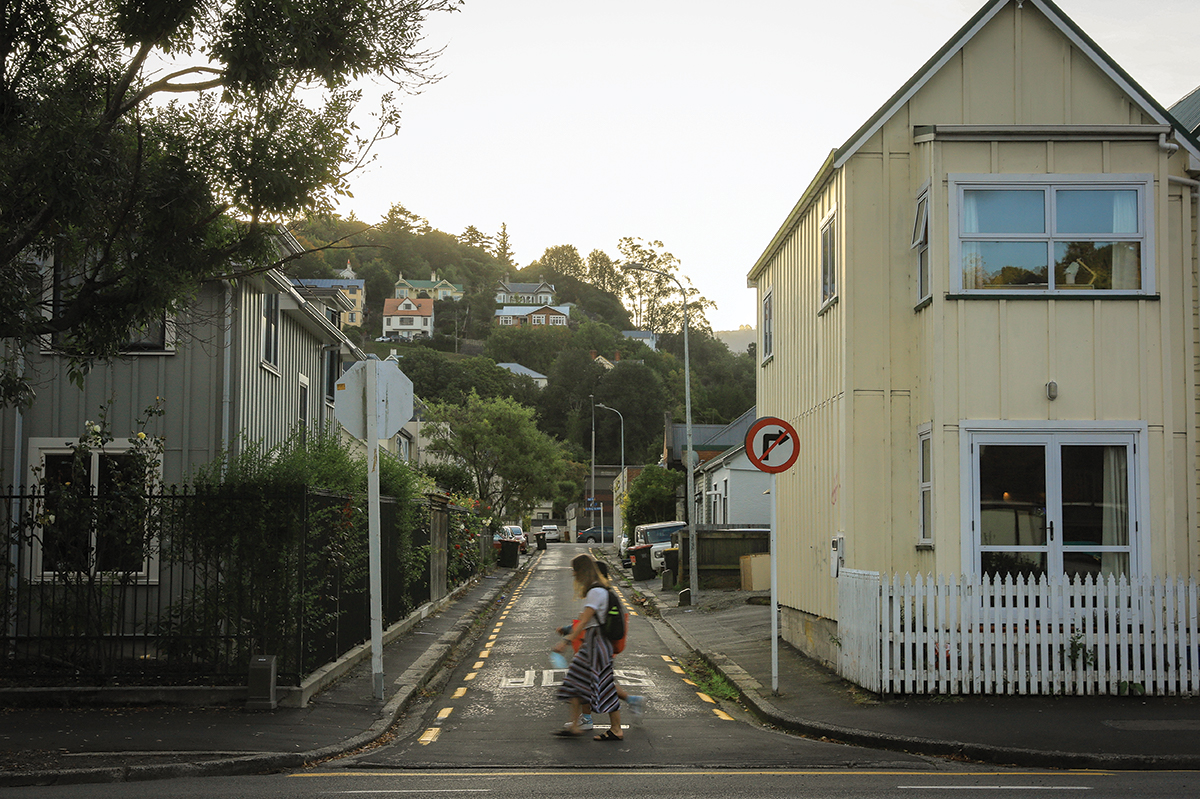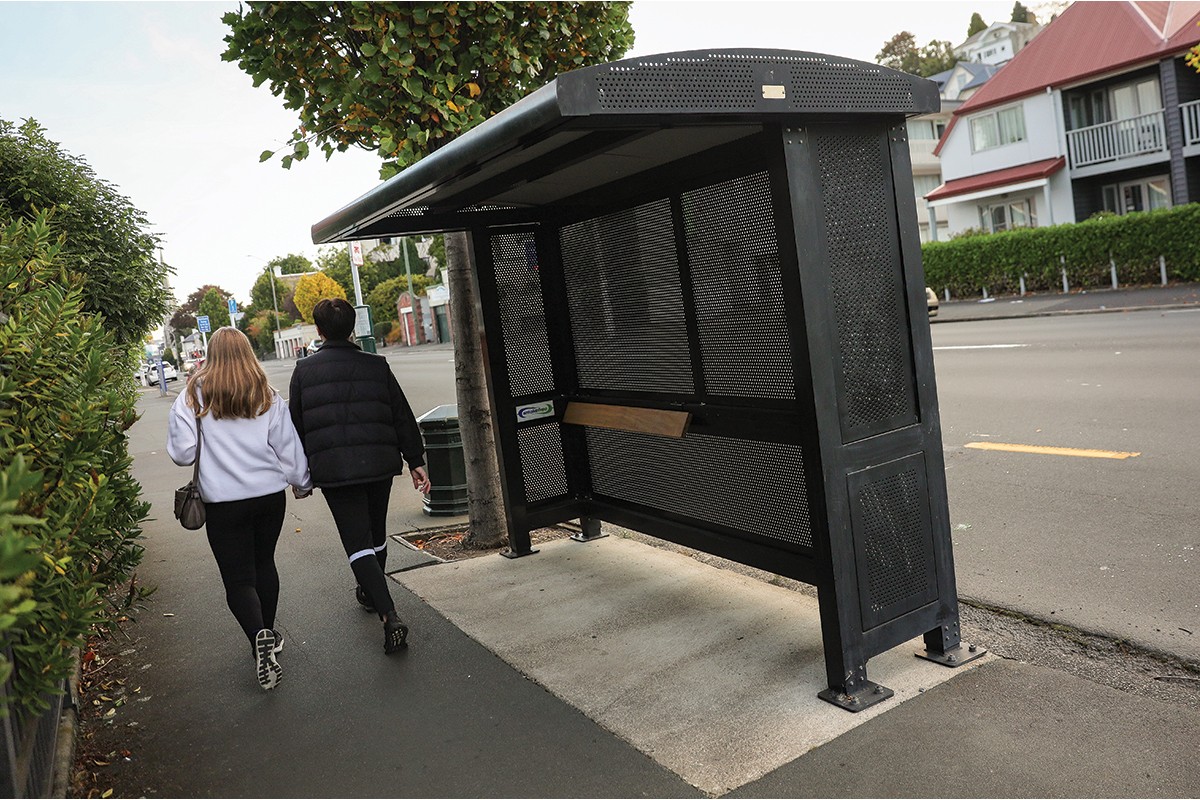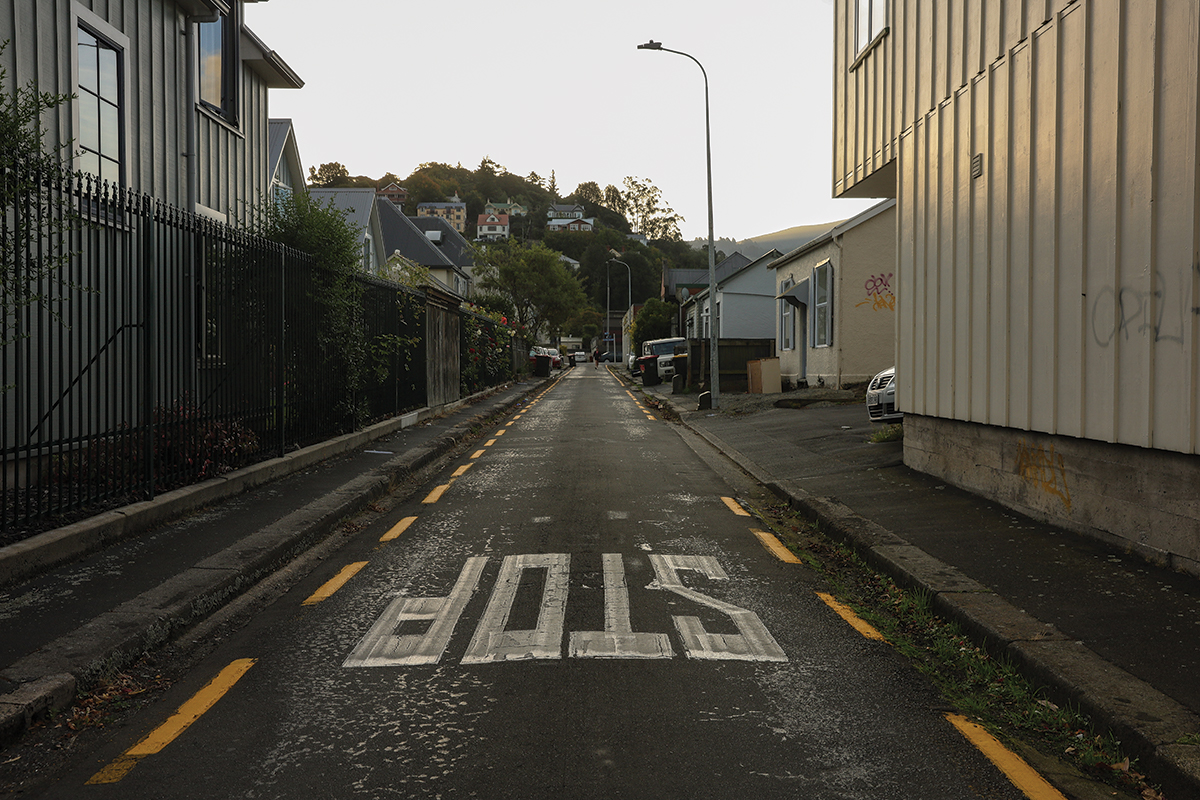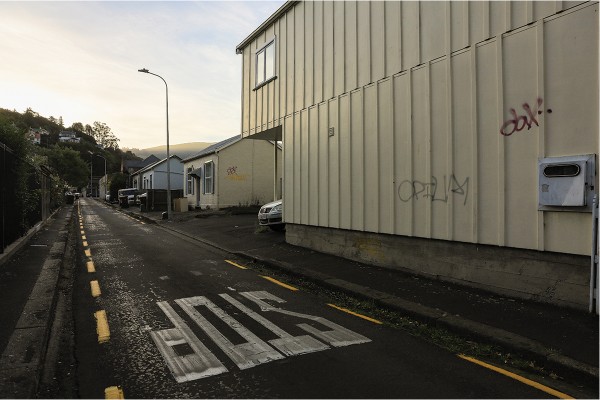Guy Fieri once said, "we're riding the bus to Flavortown". Except in this case, Flavortown is North Dunedin, and the bus we're meant to be riding didn’t even show up.
For many, barriers to accessibility make getting around Flav-, sorry, North Dunedin, more difficult than it needs to be. The structures of our lectures, our campus, and our city were all designed by different people, and those people paid varying degrees of attention to how their product would impact disabled students.
While Covid-19 was universally Bad with a capital B, there are a select few examples of the pandemic encouraging changes that communities have been asking for for decades, like pedestrianised streets from Auckland to Chicago, or the Wordle. Another example is online lectures. Disabled Students UK report that there is a perception among universities “that online provision is somehow inferior, leading them to resist the implementation of such practices for years when disabled students have asked for them”. Now that we’ve been forced inside, online lectures have proved a boon for many other reasons.
Getting up out of bed and heading into campus every day is hard enough as an able-bodied student, but local students with disabilities tell us that for many of them, on some days, it is borderline impossible. Being able to watch their course at a desk in their room is
far more accessible, and sometimes the only option. With the pandemic making online lectures the only practical option, students who can’t always make it to lectures don’t get treated any differently to the rest of their fellow students. A theatre student with fibromyalgia explained that before the pandemic if you missed a lecture you “kind of just had to suffer”, but then everything shifted online and they said they were “actually able to attend most of my lectures”.
 Whether it’s in person or online, students with chronic pain or other debilitating conditions aren’t always in a position to be paying attention to a lecturer or lab dem. Even as more in-person teaching is reintroduced at Otago Uni, disabled students say in many cases the pandemic has meant the Uni has been far more understanding about students missing labs and tutorials for whatever reason.
Whether it’s in person or online, students with chronic pain or other debilitating conditions aren’t always in a position to be paying attention to a lecturer or lab dem. Even as more in-person teaching is reintroduced at Otago Uni, disabled students say in many cases the pandemic has meant the Uni has been far more understanding about students missing labs and tutorials for whatever reason.
However, as Otago Uni and others across the country try to return to normal, some disabled students worry that the “normal” we’re trying to return to is a world that continues to exclude them. One student said that their department requires lectures to be recorded and put online, but as more lectures return to being in-person as well, lecturers sometimes forget to check, or are just unaware, if the software is running properly, and students who didn’t watch the lecture in person are left with only the presentation slides to learn from.
The Otago Disabled Students Association (ODSA) told Critic that “to roll back on hybrid and online learning means disabled students fall through the cracks” but that “the Uni has shown that accessible learning is possible and has said in its recent communication that the Otago Disabled Student’s Association will be consulted, so we will have to hope that takes the form of meaningful consultation to the end of cementing the gains made in inclusivity.”
University of Otago’s Deputy Vice-Chancellor Academic, Professor Helen Nicholson, replied that the Uni is “beginning discussions about what teaching will look like moving forward and a hybrid model will be one of the options considered. For some forms of learning, online teaching is not suitable. From an educational point of view, the University is most interested
in providing each student with the best learning opportunity.”
 ODSA also pointed out that disabled people aren’t a monolith. “Some neurodivergent learners and sensory disabled students have struggled with online learning and are eager to return in person. For the immunocompromised, this presents a risk that doesn’t give the freedom of such choice.” They advocated for the availability of both in-person and online teaching options across the board. “With hybridisation, the Uni can ensure that a decision doesn’t have to be made between accessibility and safety while ensuring nobody is left behind.”
ODSA also pointed out that disabled people aren’t a monolith. “Some neurodivergent learners and sensory disabled students have struggled with online learning and are eager to return in person. For the immunocompromised, this presents a risk that doesn’t give the freedom of such choice.” They advocated for the availability of both in-person and online teaching options across the board. “With hybridisation, the Uni can ensure that a decision doesn’t have to be made between accessibility and safety while ensuring nobody is left behind.”
As campus does begin to return to the bustling hub of student activity that it once was, disabled students point out that many buildings remain inaccessible to students with mobility issues. ODSA says that the Uni has worked extra hard to ensure new buildings
are accessible to all, but there remain issues with older buildings that “don’t really have the scope for revamping.”
Elsewhere on campus, wheelchair lifts are intended to be an easy alternative to stairs for people with mobility issues, but one student pointed out that in many cases you have to ask to use them, which can be a hassle, and some students are scared to ask if they aren’t in a wheelchair, despite there being plenty of disabled students who struggle with stairs that aren’t in a wheelchair.
Grace, an exec member of ODSA, said that “it’s kind
of like as long as their ‘stereotypical disabled person’ can theoretically use their facilities/space then it’s good enough, regardless of how accessible it is to disabled people in practice. I also find that comfort and ease of access is rarely considered in spaces that are made more accessible.” And sometimes, if you do have a mobility device there can be no space to use it. Chris Ford, a disability advocate and ODSA alum, said that he had issues with the turning space in the library toilets with his power chair, even in the accessible cubicles.
Inaccessible urban designs outside of campus are also creating unnecessary barriers for disabled students. Features of our city that may be simple inconveniences for people without disabilities are often a complete hindrance to anyone who does have a disability. Most, if not all, of the bars and clubs in town that have stairs do not have lifts. For most students, stairs mean drunkenly stumbling in and out of Suburbia, Catacombs, Eleven Bar, and XYZ, but for someone with mobility issues it often means you simply can’t get in at all. While getting on the piss may not be an essential service, there’s no reason disabled students should miss out on the fun.
Unreliable public transport was an issue repeated by many disabled students Critic Te Arohi spoke to. “Most of the time buses will be either significantly late or early, or they won’t even show up. If a bus doesn’t show up I have to take an Uber or taxi to work, and I can’t afford that, but I have to go to work,” one student said.
Otago Regional Council Transport Manager Doug Rodgers told Critic that “we absolutely support public transport being accessible for all and facilitating that access and we are disappointed to hear of some poor experiences.” Rodgers said that “traffic congestion, roadworks and diversions, passenger boardings during peak hours and a multitude of other reasons” mean buses can be late or early, and advised passengers to show up 5 minutes early. He also advised passengers “to check the ORC’s notifications and alerts” page for bus cancellations, and explained that “due to drivers isolating or being ill due to COVID, a national driver shortage, and the recent increase in capacity provided for school services, we are unable to provide extra services.”
 ODSA highlighted the attitude of some bus drivers regarding ramps as another barrier. As another student put it, “most of the time even when I have my walking stick, the buses won’t kneel because I’m young and don’t look disabled. At this point I know which drivers kneel and which ones don’t”. Transport Manager Rodgers responded that all ORC buses have the ability to kneel, and they “are in the early stages of developing a campaign to raise awareness for passengers as to how to ask for a bus to kneel. Also, the bus operators have been working with ORC and stakeholders with running accessibility training for bus drivers.”
ODSA highlighted the attitude of some bus drivers regarding ramps as another barrier. As another student put it, “most of the time even when I have my walking stick, the buses won’t kneel because I’m young and don’t look disabled. At this point I know which drivers kneel and which ones don’t”. Transport Manager Rodgers responded that all ORC buses have the ability to kneel, and they “are in the early stages of developing a campaign to raise awareness for passengers as to how to ask for a bus to kneel. Also, the bus operators have been working with ORC and stakeholders with running accessibility training for bus drivers.”
Footpaths around North Dunedin also present a number of barriers to accessibility. Streets without curb ramps, like the corner of Cumberland St and MacKenzie St pictured here, make it difficult for people with mobility issues to get through, and ODSA member Hannah pointed out that many local footpaths aren’t wide enough for mobility assistance or are uneven to a hazardous degree. Fellow disabled student Mason agreed, saying that footpaths with tree roots were unsafe in general, and “if I’m having a bad pain day I literally can’t lift my feet up over them. Neither can people in wheelchairs, or even prams.”
Cars parked illegally and other hazards can block the footpath on a good day, but on bin day the accessibility of many streets in North Dunedin is especially garbage. And while it can be easy to think that this is only one or two days of the week, disabled students asked able-bodied students to imagine having a day every single week where you just might not be able to go down your street. People kicking bins over makes things even worse, and ODSA also pointed out that broken glass can also be a big hazard for those with mobility impairments.
One of the biggest examples of inaccessible urban design around North Dunedin was bus stop benches, or the unjustified lack thereof. “Most bus stops do not have seating which becomes exclusionary for the disabled community managing fatigue, particularly as bus stops are, for members of the disabled community, the only option for transport due to financial hardship” said ODSA exec member Renn. Being disabled doesn’t just mean being in a wheelchair, and being able to sit down to wait for a bus can be essential for students with any number of mobility or chronic pain impairments. For Grace, “fatigue is way worse at the end of the day which is when many people take the bus. The lean-only option is a step up from the stops that have nothing, but really doesn’t do much to aid a lot of people who have mobility and/or stability difficulties.”
Lean-only benches, like the one pictured here on George St, are often designed with anti-homeless intentions, to prevent rough sleepers from using a bus stop as shelter. Critic Te Arohi reached out to a local homeless organisation to ask how hostile architecture like this affects the city’s homeless community, but did not receive a response. Internationally, however, there is little evidence that measures like this deter homelessness in any significant way. They do, however, create accessibility barriers for many disabled students in Dunedin, and those students want something done about it.
In correspondence with Critic, Mayor Aaron Hawkins said the benches “weren't chosen specifically to exclude those kinds of uses” but that it was “an unintended consequence of the design”. He explained that “the shelters are a standard off-the-shelf design from the Otago Regional Council. For the past 5 years or so all shelters have a bench seat too, and seats have been retrofitted from time to time responding to demand. I'm also aware of some park benches that fit the hostile description, and have already followed up on those.”
Hawkins said that the council didn’t always get things right, but were committed to improving accessibility. “One of the more sobering reports we commissioned for the George St upgrade was the accessibility audit. It was a pretty blunt assessment of how far we had to go to make it a safe and inclusive space, and addressing that is a big part of the current design work. A similar approach will be taken when we’re planning upgrades to the streets in and around the campus, whether that’s work in the short term around Albany St or in the wider tertiary streets programme.”
“As much as we can we try and take these perspectives into account at the beginning of projects, through the Disability Issues Advisory Group and others, but sometimes we will get things wrong and need to be open to fixing them,” Hawkins said.
Advocates like Disabled Students UK argue that universities, cities, and governments need to apply an “anticipatory approach” to planning, actively considering disabled people and other vulnerable communities at every stage. Those in charge of decisions are asked to simply listen to disabled people and their needs when designing stuff, rather than needing to adapt stuff after the fact. ODSA expressed concern that accessibility was “not being considered for construction” around the city, citing the narrow and uneven alternative access provided for construction works on Filleul Street.
In a response to Critic, a spokesperson said the Dunedin City Council “actively engages with our city’s disability community on a range of projects, including transport-related improvements, to bring disability and accessibility expertise into our design and procurement processes. We are consulting with the disability community on some of the city’s largest projects, such as the George Street Retail Quarter upgrade and new Mosgiel Pool, as well as our recent procurement of new public toilets, to ensure our facilities and infrastructure is accessible. We also have a regular programme of footpath improvements running across the city, which prioritises those areas in need of improved levels of service including smoother surfaces and new accessible ramps. We also continue to encourage people to recycle their glass responsibly, and to place bins on streets appropriately.”
According to ODSA, many people’s attitudes towards disabled people were a “cross-cutting issue”. Some individual behaviour is obvious; you shouldn’t really need another reason to not smash bottles or tip over bins. There are other everyday things that able-bodied students could do better though, from complaining about subtitles (which can be helpful for people with auditory processing issues) to making space on footpaths to simply treating disabled people (whether visibly disabled or not) with the same respect you would anyone else.







